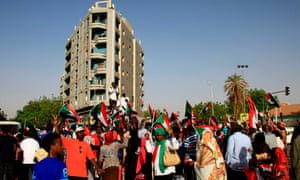Banks dispense smaller amounts from ATMs as economic turmoil in the country grows
Sudanese demonstrators from the Nuba mountains take part in a demonstration in Khartoum. Photograph: AFP/Getty Images
Mohammed Mahdi Ahmed, a pensioner, is sitting in the queue outside the Bank of Khartoum waiting to withdraw money from an ATM. It is a familiar sight across a city in the midst of a currency crisis, as well as the turmoil of Sudan’s revolution. In recent days, the bank machines have only dispensed small sums of cash – about $40 for the lucky few – until the money in the ATMs runs out.
Across the road another queue snakes along the pavement at the Farmers Commercial Bank which disappears once the machines are emptied of cash.
“I’ve been here since 7am,” says Mohammed, 72, who like many in the queue has been relying on cash borrowed from relatives to survive during Sudan’s months-long political crisis.
It is not that the people at the bank have no money. They do. The issue, as everyone complains, is that the central bank has not delivered money to the retail banks and so customers have not been able to access their funds.
“We are suffering so much,” he adds. “There are people here with 20,000 in the bank. People who need to withdraw it and who now have to come day after day to make withdrawals. I came yesterday as well and slipped and hurt my back.”
The crisis is not new. Many cash machines began running out of banknotes in November as the government scrambled to prevent economic collapse with a sharp devaluation and emergency austerity measures, a month before the beginning of the political crisis and protests that brought down the former dictator Omar al-Bashir on 11 April.
Sudan's defence minister announces state of emergency after arrest of President Bashir - video
Now after five long months the shortage of cash is biting hard, despite the promise from Saudi Arabia and the UAE of $3bn in financial aid to help stabilise Sudan’s toxic economic crisis.
It is being felt most acutely, however, on a personal level.
“It’s been two months since I’ve been able to get any cash,” says Abdul Rahman Kamal, who has been in the queue for hours. “I needed to take out money to pay for medical treatment. I can take out 2,000 Sudanese pounds today but it won’t be enough. I will have to keep coming back. I need to get my money out because I’ve been borrowing money from relatives and I don’t know if I can pay them back.”
The cash shortage, say some, has created unexpected problems in an economy where people have been selling what they own to get by.
Big ticket items such as house and car sales now have two prices, a cheaper one for those who can pay with ready cash and a higher price for payment by cheque because confidence in the banking system has been seriously eroded.
“This is why we needed a revolution,” a man shouts from the queue. “Where is our money? The central bank is supposed to give the cash to the banking system. So where are the bank notes?”
While some believe the money has been stolen, most of the problems are due to the chronic mismanagement of the former regime. Economists Jonah Rosenthal and Garbis Iradian at the Washington-based IIF said in April: “With the loss of oil revenue, the government monetised the deficit, causing inflation to spiral and reserves to dwindle as the central bank maintained an overvalued exchange rate.”
When the bank did move to devalue the pound by about 40%, it triggered soaring inflation that would become a major factor in the protests that brought down Bashir after three decades in power. It is an economic crisis that has still not played out and could have yet more dramatic consequences.
And those in the line at the Bank of Khartoum are the lucky ones. Across the road the Farmers Commercial Bank runs out of cash by mid-morning.
“They say they put £200,000 in the ATM,” says Salah Abdul Latif, an engineer who arrives too late after queuing at another bank that had also ran out of money before he could withdraw anything from the machine.
As the Guardian talks to Salah a noisy pro-democracy demonstration passes in the street. “I’ve managed up till now by borrowing money but I need money to pay my workers and to buy materials for my company. Because of the lack of cash none of us are able to work,” he says.
“And it is only four days to Ramadan,” he adds, wondering where the money will come from for the Eid feast and the tradition of buying children their new clothes. “You know, the value of [the] pound was dropping so I thought it was a good idea to bank some dollars that I had, and Saudi riyals.” He makes a face full of resignation.
“It was a bad idea because now I’m struggling to get access to my money.”






